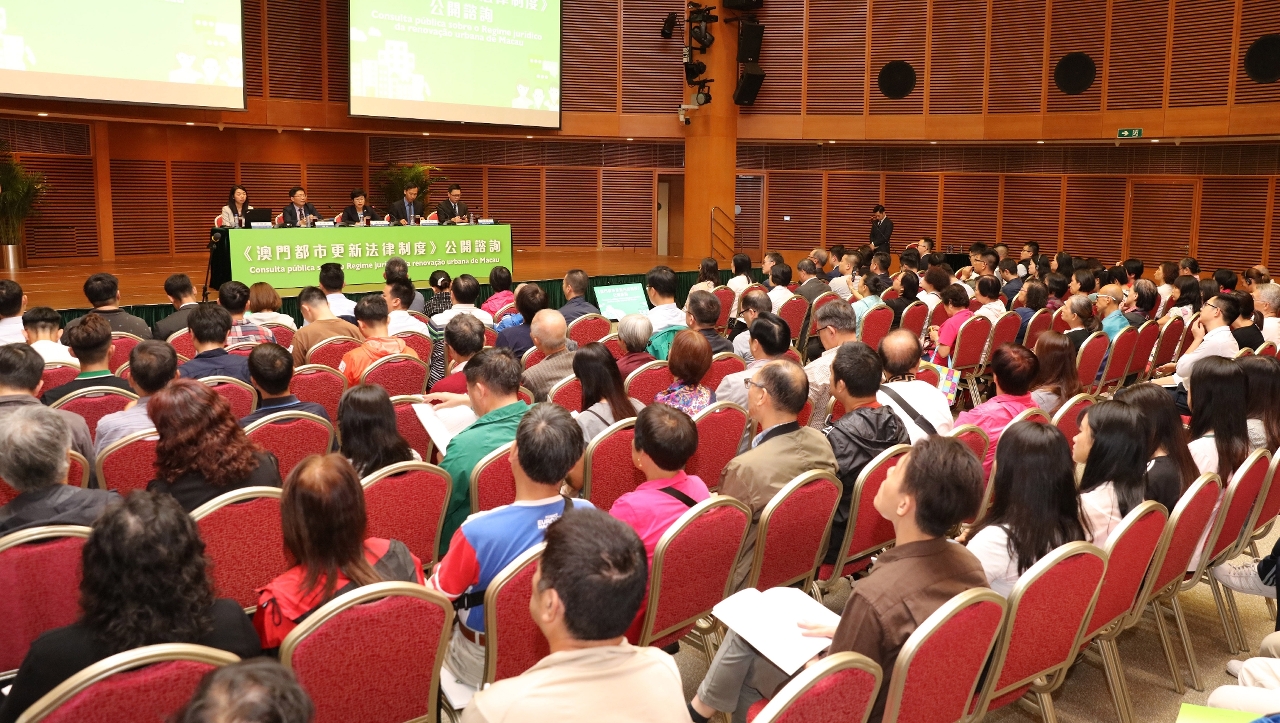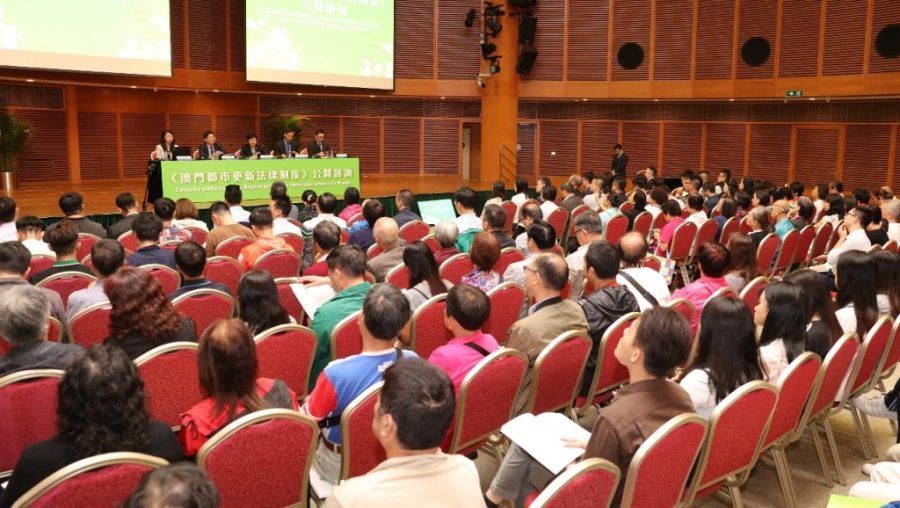Justice Sonia Chan Hoi Fan insisted on Monday that “the time is ripe” for the government to launch a public consultation on the drafting of a bill regulating the city’s urban renewal process, after having studied the matter for a number of years, even though there are only two months until the term of the current government ends, with the aim of meeting civil society’s strong demand for Macau’s urban renewal process to finally get off the ground.
The policy secretary also said that the opinions collected during the ongoing public consultation process can be used by the next government when drafting the urban renewal bill.
The government headed by Chief Executive Fernando Chui Sai On will end at midnight on December 19. Chui will be succeeded by Ho Iat Seng, who will be sworn in on December 20.
Chan responds to Sou’s question
Chan made the remarks in response to a question by nonestablishment legislator Sulu Sou Ka Hou, during a consultation session which the government held for lawmakers where Chan and a number of officials listened to their opinions on the drafting of proposed legislation on the city’s urban renewal process. The session was held in the building of the Legislative Assembly (AL).
Monday’s consultation session for lawmakers was part of the ongoing two-month public consultation
on the matter, which was launched on October 11 and will end on December 9. Three sessions for members of the public have been scheduled during the consultation period. The government arranged for a session for lawmakers on Monday.
Civic leaders have been criticising the government for failing to push ahead with urban renewal in run-down neighbourhoods such as Iao Hon district.
During Monday’s session, Sou said that Macau’s urban renewal should be carried out based on principles such as improving residents’ quality of life and ensuring the city’s sustainable development, adding that the government should ensure the full protection of the private property rights of residents affected by urban renewal projects.
Sou also said that urban renewal projects should not turn out to be mere property development projects, adding that the city’s urban renewal should not be carried out in a way that “makes use of the disadvantages of residents in the city’s old quarters” with the aim of making huge profits.
Sou said that he wondered why the government now suddenly launched a public consultation on the drafting of an urban renewal bill only two months before the new government is sworn in, as the outgoing government had not made any progress in pushing ahead with Macau’s urban renewal.
“It is difficult for me to accept a public consultation document which even Secretary for Transport and Public Works [Raimundo do Rosario] has not read and which has been drafted without any discussions with Chief Executive- designate [Ho Iat Seng],” Sou said, adding that the proposals by the government on the consultation document were vague and appeared to favour property developers and fail to protect the interests of the owners of residential units affected by the urban renewal.
Responding to Sou’s question, Chan said that the setting-up of a legal system on Macau’s urban renewal process had always been one of the current government’s major policies, adding that it was not the case that the government only started to engage in the legislative work a few months ago.
Chui became chief executive in December 2009, and was re-elected for a second and constitutionally final consecutive five-year term in 2014.
Chan said that during the current five-year term, various government entities have been carrying out their own studies concerning preparations for the setting-up of an urban renewal legal system.
Chan added that the government-appointed Urban Renewal Council – which was established in 2016 – has been taking part in the government’s study on the matter, adding that the government has also referenced the contents of a preliminary research report drafted by a consultancy which has been hired to carry out a research study on how the city’s urban renewal process should go ahead, before completing the public consultation document.
Chan also said that the current government believes that the “the time is ripe” to push ahead with the proposed setting-up of a legal system regulating the city’s urban renewal process, adding that as the government is aware of the fact that Macau’s civil society wishes the urban renewal process to finally get off the ground, it had decided to launch a public consultation on the drafting of an overall urban renewal bill “as soon as possible” so that the government could exchange its ideas on the matter with members of the public.
Jointly drafted document
Chan also said that the public consultation document was jointly drafted by government entities under her portfolio and entities under the Secretariat for Transport and Public Works’ portfolio. Chan noted that in addition to opinions raised by the Urban Renewal Council and the contents of the consultancy’s preliminary research report, the government has drafted the consultation document after referencing opinions raised by civic leaders, associations and lawmakers, adding that the two- month public consultation would be able to provide the incoming government with opinions collected from civil society so that the city’s urban renewal process could be launched quickly in the future.
The bill proposes that only 80 per cent of condominium unit owners will be required to agree to the redevelopment of buildings that are older than 40 years.
In Macau, currently, a building can only be redeveloped if all its condominium unit owners agree to the redevelopment.
The bill proposes that the proportion of flat owners required to agree to the redevelopment of their building be 90 per cent for buildings that are between 30 and 40 years old.
The bill also proposes for buildings that have already been demolished after officially having been classified as dilapidated or posing a danger to public health or safety, only 60 per cent of condominium unit owners will be required to agree to the redevelopment of their building.
The government also proposes that residential unit owners affected by urban redevelopment projects can choose one of two options: 1) similar property swap; 2) cash compensation.
Meanwhile, non-establishment lawmaker Ng Kuok Cheong urged the government to take the interests of small property owners into account when carrying out the urban renewal process. He pointed out that the proposed legislation includes the possibility of expropriation.
According to official statistics, there are about 4,000 buildings in Macau that are at least 30 years old and that therefore can be included in the urban renewal process.






